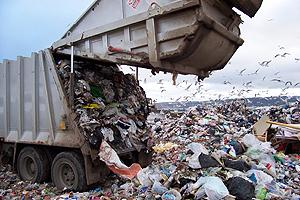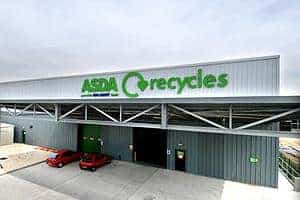The group chaired by former environment minister John Gummer MP and Ecologist editor Zac Goldsmith produced its final report today, after 18 months of deliberation.
Among its key recommendations are a Natural Resources Trust to coordinate action needed as well as providing advice on best practice, more producer responsibility measures for all waste streams, and a joined up approach to municipal and non-municipal waste.
It also recommends incentives for household recycling, a clampdown on inefficient incinerators and a move towards using smaller, local waste facilities to cut down on “waste miles”.
Zero to landfill
The Quality of Life report offers stern warnings on the environmental impact of waste sent to landfills, and offers strong suggestions on how to reach its “ambitious, aspirational agenda” of moving towards a zero waste economy.
It calls for a phased introduction of bans on landfilling recyclable or compostable materials to “send a clear signal to industry that landfilling recyclable materials will not be considered acceptable in the future”.
All materials which could be recycled or composted would be banned from landfill and all recyclable materials would be banned from incineration.
Quality of Life report
This might start with the easiest-to-recycle materials, or those for which a landfill ban will bring the greatest environmental benefit. The report suggests starting with aluminium by 2010, then all biodegradable materials – paper, cardboard, organic wastes and food waste – by 2015.
By 2012, the Conservatives are also recommended to adopt a ban on incinerating all biodegradable material that has not gone through some form of pre-treatment. The Quality of Life report does look favourably on turning residual waste into refuse-derived fuel, but only where the “maximum recycling and removal of recyclable materials has been carried out”.
“Over a period of some 20 years, we should move to a situation where all materials which could be recycled or composted would be banned from landfill and all recyclable materials would be banned from incineration. Thus we could close the loop and ensure we redesign waste as a resource,” the report states.
The report recommends backing up the landfill bans with a stiff rise in the Landfill Tax – to £80 per tonne by 2015, and rising £5 per tonne every year after that. This would be reviewed by the proposed Natural Resources Trust, with revenue to be spent locally, particularly on waste management infrastructure.
Municipal
In order to bring behavioural change among householders to recycle more waste, the Quality of Life report recommends Council Tax discount incentives and a greater transparency on waste management charges.
It suggests Council Tax bills show detailed costs for waste services – collection, recycling and disposal – and discounts be offered to those who recycle their waste. The report points out that existing technology could be used to direct the incentives at certain post code areas or communities, “particularly in areas of high density housing”, perhaps to fund local school or park equipment or sports facilities.
The report makes various recommendations on encouraging councils to link up to provide recycling and waste services, and urges councils to seek “uniformity of recycling principles over a wide area” in order to spread better understanding of recycling among householders.
It also takes the view that green waste collections should not contribute towards council recycling targets.
Concerning treatment options for waste, councils should be encouraged to think locally and reduce “waste miles”, the report says. It calls for the planning regime to be adjusted to “favour small, flexible and selective schemes rather than large, inflexible and mass-burn schemes”.
We need better producer responsibility policies that will actually change the nature of products.
Quality of Life report
On residual waste, the Quality of Life recommendations seek to encourage the use of new technologies – in particular it highlights anaerobic digestion as having “proven carbon benefits”.
The report warns of the danger of councils from the “lock in” of long-term contracts with large energy-from-waste plants, “creating a situation where marginal costs of disposal fall to zero, reducing incentives to increase recycling rates”. The policy review recognises the place of refuse-derived fuels being used to generate energy where maximum recycling has been carried out.
As for incineration itself, the report does back highly-efficient incinerators – proposing a disposal tax for those plants that do not meet new EU efficiency criteria of at least 65% efficiency and “preferably” 70% efficiency at turning waste into energy. This suggests useable heat, not just electricity, needs to be generated from waste.
“Mass burn incineration with energy and heat recovery can also be an acceptable means of disposal as long as the efficiency of energy generation is sufficiently high”, it says.
Business
The recycling of commercial and industrial waste should reach 35 million tonnes a year by 2020, and on top of that construction and demolition waste 88 million tonnes a year by that date, it says. Along with the 22 million tonnes of municipal waste being recycled each year by that time, this would have an annual value to the economy of £1.8 billion, it claimed.
But the report also points out that “recycling is the second priority” that the Conservatives should push. Waste minimisation should be top priority, it says, from tackling the short life spans of modern-day products to the lack of recyclability of many designs.
The report calls for smarter manufacturing, cleverer distribution, the use of renewable materials and a minimisation of packaging.
With the Natural Resources Trust firmly at the helm, the Conservative group would like to see a major expansion of the concept of producer responsibility, away from the existing measures it dismisses as “dilute incentives” with “limited success”. Existing measures are restricted to certain products – vehicles, electronics, packaging – covering “only 16% of total controlled waste generated”, the group's report said.
“We need better producer responsibility policies,” it argues, “that will actually change the nature of products. This is not a new idea, but it has rarely worked well in practice.”
The proposed Trust would establish a detailed programme extending producer responsibility legislation to cover “a much more significant proportion of household, commercial and industrial waste streams”.
Candidates for new measures include pharmaceuticals, paints, construction and demolition wastes, nappies, food, furniture, carpets and textiles. “The objective is to include all waste streams.” A priority should be placed on products classed as hazardous wastes, it added.
The report calls for sectoral targets for resource use, but with a voluntary approach “backed up by the threat of statutory targets if little progress was made”. Voluntary, early compliance would be rewarded by exemptions from more prescriptive regulatory regimes.
The Tory group also recommends the use of packaging deposit schemes and take back schemes for certain products, perhaps with compostable items made exempt. It also suggests a tax on electronic goods that are not “repairable or upgradable”.
The Natural Resources Trust could also act to drive public procurement to require public bodies to use more recycled products. Public bodies – who spend more than £125 billion on products between them each year – would be required to set procurement plans meeting a new Sustainable Procurement Standard.













Subscribe for free